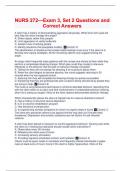Exam (elaborations)
NURS 272—Exam 3, Set 2 Questions and Correct Answers
- Course
- Institution
client has a history of demonstrating aggression physically. What short-term goal will best help the client manage this anger? A. Strike objects rather than people. B. Limit aggression to verbal outbursts. C. Isolate in lieu of striking people. D. Identify situations that precipitate hostility. Cor...
[Show more]



